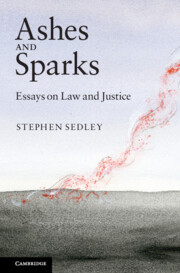Book contents
- Frontmatter
- Contents
- Preface
- Acknowledgements
- PART I History
- PART II Law
- PART III Justice
- 24 The right to know
- 25 The moral economy of judicial review
- 26 Policy and law
- 27 Responsibility and the law
- 28 The Crown in its own courts
- 29 Human rights – who needs them?
- 30 Fundamental values – but which?
- 31 Overcoming pragmatism
- 32 Sex, libels and video-surveillance
- 33 This beats me
- 34 Public inquiries: a cure or a disease?
- 35 Human rights: a twenty-first century agenda
- 36 Are human rights universal, and does it matter?
- 37 Bringing rights home: time to start a family?
- 38 The four wise monkeys visit the marketplace of ideas
- Index
25 - The moral economy of judicial review
Published online by Cambridge University Press: 05 June 2012
- Frontmatter
- Contents
- Preface
- Acknowledgements
- PART I History
- PART II Law
- PART III Justice
- 24 The right to know
- 25 The moral economy of judicial review
- 26 Policy and law
- 27 Responsibility and the law
- 28 The Crown in its own courts
- 29 Human rights – who needs them?
- 30 Fundamental values – but which?
- 31 Overcoming pragmatism
- 32 Sex, libels and video-surveillance
- 33 This beats me
- 34 Public inquiries: a cure or a disease?
- 35 Human rights: a twenty-first century agenda
- 36 Are human rights universal, and does it matter?
- 37 Bringing rights home: time to start a family?
- 38 The four wise monkeys visit the marketplace of ideas
- Index
Summary
During my twenty-eight years at the Bar I took three sabbaticals. The first time, in 1983, my senior clerk pulled a long face and said ‘They'll all have forgotten who you are by the time you come back’. He was wrong, but although the six months I spent as a visiting professor at Warwick University were every bit as rewarding as advocacy, they confirmed two things: my regard for law teachers and the certainty that I was not cut out to be one.
Later, in 1996, Lord Nolan and I shared the Radcliffe Lectures at Warwick University. They were published in book form with an afterword by the law school's founding professor, Geoffrey Wilson, which many readers thought the best thing in the book. I was happy in return to contribute an essay – this one – to the volume marking the law school's twenty-fifth anniversary.
My remark in this paper that press criticism of the judiciary was confined to miscarriages of criminal justice and not directed to judicial review was shortly to be falsified by a Whitehall campaign of briefings against a number of administrative law judges whose decisions had displeased ministers.
The possibility that the courts might one day strike down primary legislation as unconstitutional, although mentioned in this essay, is not something I either anticipate or favour. It is a curious fact, however, that the closest we have come to such a challenge is the litigation contesting the validity of the legislation restricting hunting with dogs.
- Type
- Chapter
- Information
- Ashes and SparksEssays On Law and Justice, pp. 246 - 254Publisher: Cambridge University PressPrint publication year: 2011



